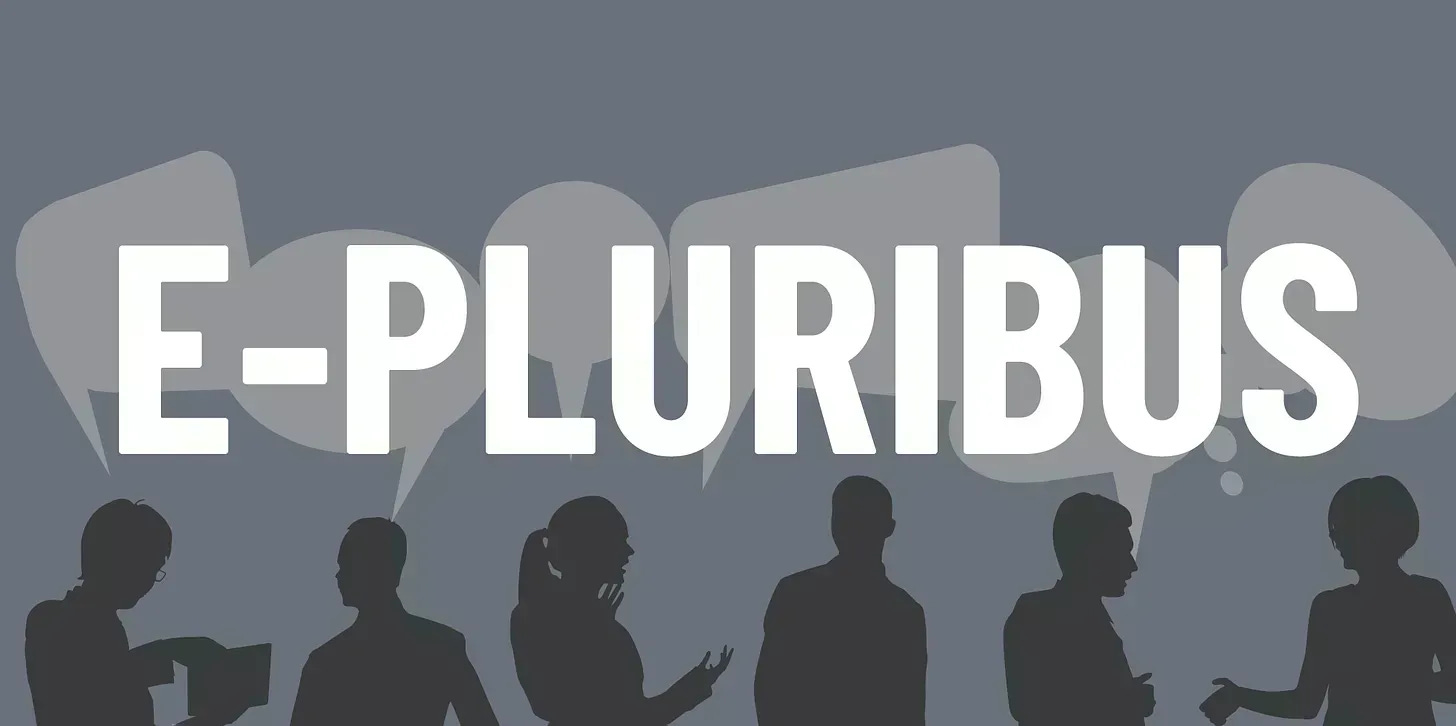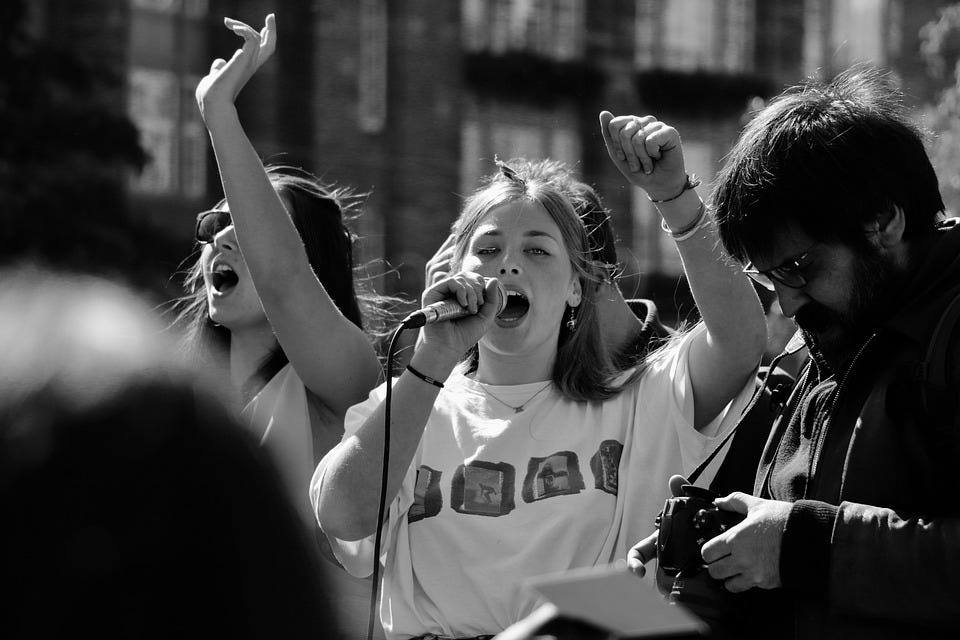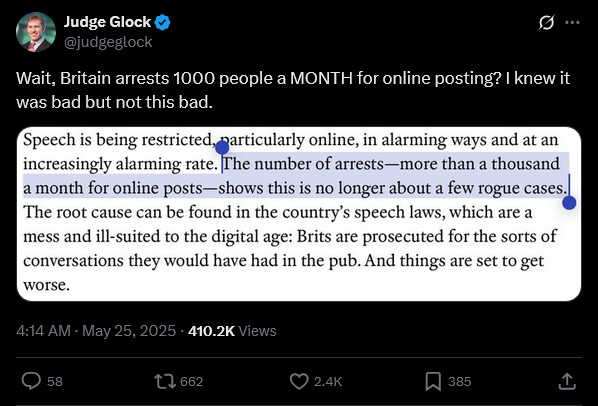E-Pluribus | May 29, 2025
Do middle school students have 1A rights? Harvard should call the government's bluff. Privatize NPR.
A round-up of the latest and best musings on the rise of illiberalism in the public discourse:
Adam Liptack: Justices Allow School to Bar Student From Wearing ‘Only Two Genders’ Shirt
On Tuesday, the Supreme Court declined to hear the case of a junior high student who was sent home for wearing a shirt that read, “There are only two genders.” According to Times reporter Adam Liptack, the decision highlights a conservative Court deeply divided over free speech rights. It also signals how at least some of the Justices might rule on another crucial First Amendment case:
The Supreme Court on Tuesday let stand an appeals court decision that allowed a public school in Massachusetts to prohibit a seventh grader from wearing a T-shirt that said “There Are Only Two Genders,” declining to hear the case over heated dissents from two conservative justices.
Justice Samuel A. Alito Jr., joined by Justice Clarence Thomas, said the court should have agreed to take the case and ruled for the student on free speech grounds.
“If a school sees fit to instruct students of a certain age on a social issue like L.G.B.T.Q.+ rights or gender identity,” Justice Alito wrote, “then the school must tolerate dissenting student speech on those issues.”
The opinion illustrated a split among the members of the court’s six-member conservative supermajority, said Justin Driver, a law professor at Yale.
“The dissent both illuminates and underscores a significant divide among the six Republican-appointed justices,” he said, “with Alito and Thomas comfortable voicing positions that the other four would prefer to avoid.”
…
The case from Massachusetts involved a student identified in court papers as L.M. who tried to wear the shirt at Nichols Middle School in Middleborough in 2023. When students and a teacher complained, the principal told the student that he could not return to class unless he changed clothes. He refused and was sent home.
Later, the student came to school wearing a T-shirt that this time said “There Are CENSORED Genders.” He was told that was not permitted, either. Rather than missing more school, he changed clothes.
His parents sued, saying the school’s policy violated the First Amendment. They relied on a landmark 1969 Supreme Court decision, Tinker v. Des Moines Independent Community School District, which held that public school students have First Amendment rights. In that case, students sought to wear black armbands to protest the Vietnam War.
…
In the Massachusetts case, a federal trial judge ruled for the school, saying that the student’s shirts had invaded the rights of other students. The U.S. Court of Appeals for the First Circuit, in Boston, affirmed that ruling.
…
The court will soon decide a case on a related question: whether public schools in Maryland must allow parents with religious objections to withdraw their children from classes in which storybooks with L.G.B.T.Q.+ themes are discussed.
Professor Driver said that “Justice Alito’s emphasizing the dangers of ‘indoctrination’ of younger students could well preview a theme” in the Maryland case.
In addition to joining Justice Alito’s dissent, Justice Thomas, long a skeptic of minors’ First Amendment rights, wrote separately to say that he believed that Tinker should be overruled. “But, unless and until this court revisits it, Tinker is binding precedent that lower courts must faithfully apply,” he wrote.
Autumn Billings: Harvard's Best Protection Is To Get Off the Federal Teat
Like many free speech advocates, Reason’s Autumn Billings is troubled by the government’s efforts to dictate policy to Harvard by threatening its federal funding. But unlike other critics, she says the school should call the president’s bluff and stop taking taxpayer money—robbing the feds of any leverage they have over the university:
The Trump administration announced on Thursday that it is rescinding Harvard University's ability to enroll international students, increasing pressure on the school to fall in line with the president's agenda.
…
After its bold refusal to comply with Trump's demands, Harvard seems to have been singled out for its insubordination. Trump retaliated by freezing $2.6 billion in federal research grants to the university, and Thursday's move threatens even more of Harvard's bottom line. About 27 percent of the student body is made up of international students … many of whom pay a larger share of education costs.
…
The feud raises the question of why an institution like Harvard—which has an endowment of over $53 billion—needs government money in the first place. Trump is not the first president, nor will he be the last, to use the power of the executive branch to strong-arm private universities. One way Harvard can protect its independence and mitigate intrusive government interference is by weaning itself from federal funding, and thus freeing itself from the strings that come attached to the funds.
…
Harvard has filed lawsuits challenging the conditions Trump is trying to impose. But no matter who prevails in the legal battles to come, free speech and pluralism will be better off if Harvard—and other private universities—start eschewing federal money.
David Harsanyi: The case for defunding NPR and PBS is about a lot more than bias
At the Washington Examiner, David Harsanyi writes that NPR and PBS should also ditch their government funding. Not only would it be smart business — NPR and PBS actually have massive, wealthy audiences — it would effectively end government-dictated programming, which, Harsanyi concludes, is the real problem. Right-wing public broadcasting is still public broadcasting, after all:
The president is right that PBS and NPR fail to reflect the “public” mood in any honest way. Trump, whether you like him or not, is the president of the United States, and yet PBS and NPR can barely find a guest to explain the outlook of a large segment of the country.
When Uri Berliner, a former editor at NPR, complained that over 80 registered Democrats were editors at the Washington, D.C., office but not one Republican, he was driven from his job. It’s not merely news, though; it’s also cultural programming that largely appeals to educated, affluent, upper-middle-class white audiences. There’s, of course, nothing wrong with that content, but it’s strongly skewed against social conservatives.
Now, NPR and PBS could surrender and placate Trump and probably keep the money. And that would be just as big a problem. Neither the news nor cultural preferences should be dictated by the government.
…
There’s simply no good-faith interpretation of the Constitution that says taxpayers have a responsibility to fund political media. Indeed, to do so is stratospherically beyond the scope of constitutional governance. Any pressure that the president can bring to NPR only exists because these outlets are reliant on the state. Though the First Amendment exists to protect the press, not bankroll the newest Ken Burns documentary.
Capehart, who blames “racism and misogyny” for the Democratic Party losses in 2024 — and virtually everything else — is free to give his “unfettered” opinion as often and as aggressively as he likes. But it takes a special kind of arrogance to demand taxpayers prop up your opinions.
…
Biased or not, NPR is a highly successful venture with millions of affluent consumers who can easily afford to pay for their own content. NPR’s radio shows average around 26 million listeners on over 1,000 stations across the country. It’s podcasts — many of them I find quite entertaining — attract 17 million users.
NPR would immediately become one of the top radio and podcast networks in the country if it monetized its business. The same goes for PBS, which has 350-member television stations across the United States, reaching 100 million viewers monthly. That’s twice as many viewers as streaming services such as Hulu or Apple+.
Around X
Apparently, the UK is arresting thousands of its own citizens each year for posting wrongthink online.
The US government appears to be worried about international speech regulations as well, announcing travel restrictions on foreign officials whose governments have censored American citizens.
Jonathan Haidt explains how Americans can protect their kids from online threats without — and this is crucial — inviting government censorship of the internet.









